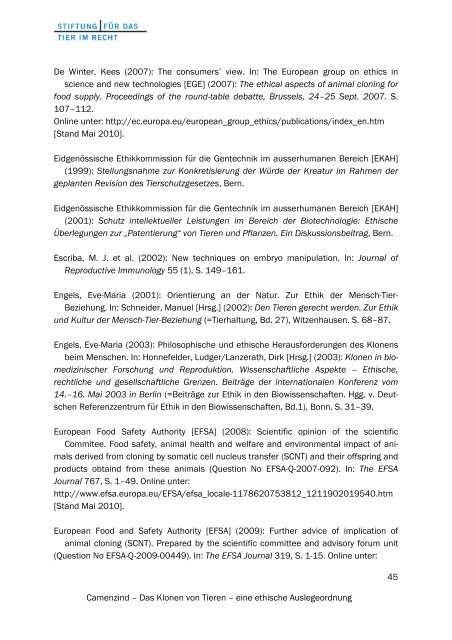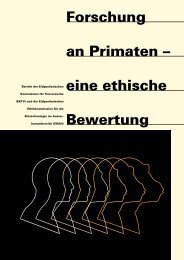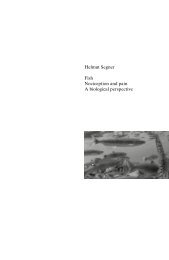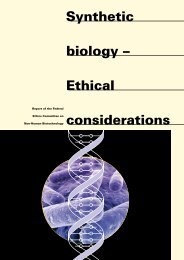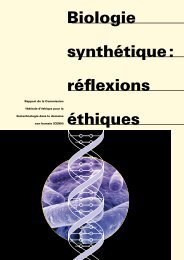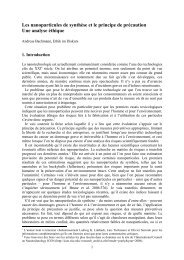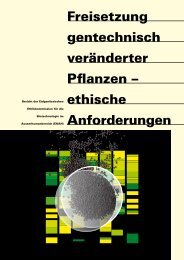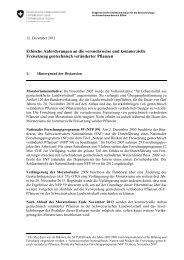Das Klonen von Tieren – eine ethische Auslegeordnung
Das Klonen von Tieren â eine ethische ... - EKAH - admin.ch
Das Klonen von Tieren â eine ethische ... - EKAH - admin.ch
- No tags were found...
You also want an ePaper? Increase the reach of your titles
YUMPU automatically turns print PDFs into web optimized ePapers that Google loves.
De Winter, Kees (2007): The consumers’ view. In: The European group on ethics in<br />
science and new technologies [EGE] (2007): The ethical aspects of animal cloning for<br />
food supply. Proceedings of the round-table debatte, Brussels, 24<strong>–</strong>25 Sept. 2007. S.<br />
107<strong>–</strong>112.<br />
Online unter: http://ec.europa.eu/european_group_ethics/publications/index_en.htm<br />
[Stand Mai 2010].<br />
Eidgenössische Ethikkommission für die Gentechnik im ausserhumanen Bereich [EKAH]<br />
(1999): Stellungsnahme zur Konkretisierung der Würde der Kreatur im Rahmen der<br />
geplanten Revision des Tierschutzgesetzes, Bern.<br />
Eidgenössische Ethikkommission für die Gentechnik im ausserhumanen Bereich [EKAH]<br />
(2001): Schutz intellektueller Leistungen im Bereich der Biotechnologie: Ethische<br />
Überlegungen zur „Patentierung“ <strong>von</strong> <strong>Tieren</strong> und Pflanzen. Ein Diskussionsbeitrag, Bern.<br />
Escriba, M. J. et al. (2002): New techniques on embryo manipulation. In: Journal of<br />
Reproductive Immunology 55 (1), S. 149<strong>–</strong>161.<br />
Engels, Eve-Maria (2001): Orientierung an der Natur. Zur Ethik der Mensch-Tier-<br />
Beziehung. In: Schneider, Manuel [Hrsg.] (2002): Den <strong>Tieren</strong> gerecht werden. Zur Ethik<br />
und Kultur der Mensch-Tier-Beziehung (=Tierhaltung, Bd. 27), Witzenhausen. S. 68<strong>–</strong>87.<br />
Engels, Eve-Maria (2003): Philosophische und <strong>ethische</strong> Herausforderungen des <strong>Klonen</strong>s<br />
beim Menschen. In: Honnefelder, Ludger/Lanzerath, Dirk [Hrsg.] (2003): <strong>Klonen</strong> in biomedizinischer<br />
Forschung und Reproduktion. Wissenschaftliche Aspekte <strong>–</strong> Ethische,<br />
rechtliche und gesellschaftliche Grenzen. Beiträge der internationalen Konferenz vom<br />
14.<strong>–</strong>16. Mai 2003 in Berlin (=Beiträge zur Ethik in den Biowissenschaften. Hgg. v. Deutschen<br />
Referenzzentrum für Ethik in den Biowissenschaften, Bd.1), Bonn. S. 31<strong>–</strong>39.<br />
European Food Safety Authority [EFSA] (2008): Scientific opinion of the scientific<br />
Commitee. Food safety, animal health and welfare and environmental impact of animals<br />
derived from cloning by somatic cell nucleus transfer (SCNT) and their offspring and<br />
products obtaind from these animals (Question No EFSA-Q-2007-092). In: The EFSA<br />
Journal 767, S. 1<strong>–</strong>49. Online unter:<br />
http://www.efsa.europa.eu/EFSA/efsa_locale-1178620753812_1211902019540.htm<br />
[Stand Mai 2010].<br />
European Food and Safety Authority [EFSA] (2009): Further advice of implication of<br />
animal cloning (SCNT). Prepared by the scientific committee and advisory forum unit<br />
(Question No EFSA-Q-2009-00449). In: The EFSA Journal 319, S. 1-15. Online unter:<br />
Camenzind <strong>–</strong> <strong>Das</strong> <strong>Klonen</strong> <strong>von</strong> <strong>Tieren</strong> <strong>–</strong> <strong>eine</strong> <strong>ethische</strong> <strong>Auslegeordnung</strong><br />
45


